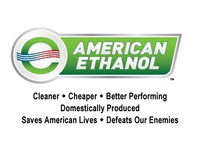The Ethanol Dividend
 |
"Unquestionably alcohol is the fuel of the future..."
Thomas Midgley, Jr., General Motors scientist, co-inventor of 'leaded' gasoline
By Marc J. Rauch
Exec. Vice President/Co-Publisher
THE AUTO CHANNEL
Originally published August 6, 2011
A hundred years ago, ethanol (alcohol fuel) was the engine fuel of choice for objective persons-in-the-know. This was true in America and anywhere in the world that was starting to be impacted by that new-fangled invention, the automobile. For alcohol to be preferred over gasoline was quite amazing considering that it had to overcome the oil industry’s forty-year head start in developing sophisticated production facilities and distribution outlets. Moreover, alcohol had to overcome an onerous $2.08 tax on every gallon, as well as the significant marketing war chest of John Rockefeller and Standard Oil.
Even the 18th Amendment to the U.S. Constitution (Prohibition), which was funded by Rockefeller’s multi-million dollar “donations” to politicians, failed to quench the thirst for ethanol in objective business and technology leaders who knew its advantages.
 The infamous Lakeview Oil Gusher Disaster of 1910 |
Armed with the new found (potential) wealth, there was nothing that was going to stop General Motors, not even the deaths of dozens of employees as a result of working with the lead formulas. Likewise, it was full-speed ahead for Standard Oil who now had a gasoline-committed partner/customer that just happened to be the world’s number one automaker. (Although GM and Standard Oil would never be charged for collusion or conspiracy regarding their lead gasoline venture, they were found guilty of conspiracy in Federal Court in what became known as the “Great American Streetcar Scandal.”)
However, there was one thing that stood in the way of gasoline’s complete dominance as an engine fuel: Ethanol was better than gasoline in every way (power, environmental issues, cost, safety, renewable availability, and no reliance on foreign sources). Considering that America was the only industrialized country in the western hemisphere or Europe with alcohol prohibition, there was still plenty of potential competition from alcohol. Additionally, as it was possible that Prohibition could eventually be overturned (which it was), alcohol and all its advantages would be back to challenge the monopoly of gasoline and billions of dollars in extra profits. So there was only one thing to do; lie about alcohol. Yes, good old propaganda.
Amazingly, nearly all the lies and misconceptions dreamed up by the oil/gasoline lobby in the teens and twenties to fight ethanol are still with us today. Ironically, most of the lies are the direct opposite of the actual truths. For example, the most common lies told about ethanol are:
• Ethanol damages engines
• Ethanol produces less power than gasoline
• America can’t produce enough ethanol to replace
gasoline
The most pernicious misconceptions ascribed to ethanol are:
• Using corn for ethanol causes food prices to rise and takes food
away from the
world's starving peoples
• Ethanol is environmentally harmful
• It takes more energy to produce a gallon of ethanol than the gallon of ethanol puts out
• Ethanol gets unfair, wasteful government subsidies
But the truth is that:
• Alcohol cleans engines, and they burn cooler. An engine that uses ethanol can last two or more times longer an engine that uses gasoline.
• Alcohol fuel is used in race cars that want to get greater power and performance. In an engine that is optimized to run on gasoline it is natural to expect that any other fuel might not perform as well. However, if the same engine is then optimized to use alcohol it will perform as well or better.
• If 100% of all corn grown in America were used to make ethanol, then we could produce enough ethanol to replace all gasoline…and we would still be able to get the DDG for needed feedstock. Backyard barbecuers and corn flakes cereal addict might suffer, but that’s all. In reality, other crops would feature in the mix, some that don’t require existing crop or farmland and very little water. The alcohol yield from these plants is significantly higher than corn. Seaweed harvested from the Gulf of Mexico alone could provide all the ethanol needed to replace gasoline in America.
• The food-for-fuel argument is completely false. It has been debunked from every angle and the World Bank has retracted its original accusation that corn used for ethanol caused food price increases and food shortage.
• Ethanol critics deride ethanol production if fossil fuels are used anywhere in the process of growing, harvesting, distilling and shipping alcohol. These charges are presented as if oil and gasoline weren’t guilty of the same criticisms. In the worst case situation, at least it could be said that the final ethanol product vs. gasoline is far more environmentally friendly. Gasoline has no advantages whatsoever. In truth, however, fossil fuels do not have to be used to produce ethanol. In some instances natural, on-site nutrients can be used as fertilizer, ethanol or other biofuels can be used to operate harvesting equipment, and non-fossil fuel energy sources can be used to power the distillation process.
• Critics make it sound as though subsidies are exclusively given for ethanol production. However, the oil industry has received more government subsidies, allocations, inducements, and tax breaks than any other energy technology, energy source or fuel. Every subsidy ever granted to oil/gasoline in the last hundred years is still in effect. In addition, untold billions of dollars, and tens of thousands of American lives have been spent on wars related to protecting foreign oil. No amount of subsidies to produce domestic ethanol will ever be too expensive compared to our servicemen’s lives.
• Using arcane and irrelevant methods of measuring how much energy is expended to produce ethanol (such as the energy required to build brand new tractors), critics like David Pimentel don’t take into account comparable measurements in evaluating EROEI (energy returned on energy invested) for gasoline.
 |
But what they forget, or didn’t understand in the first place is the “ethanol dividend.” The Obama Administration, or any federal administration, pumps in billions and trillions of dollars to stimulate the economy. If those stimulus dollars are not surplus, the government has to print more dollars, thereby devaluing all dollars. It’s said that one billion dollars leaves America every day to pay for foreign oil. These dollars may never make their way back to America. If we can avoid sending the $1 billion a day ($360 billion per year) out of the country, and instead use those dollars here to pay salaries and buy domestically produced goods, those dollars become stimulus for the economy without having to print additional dollars and devalue those already in circulation. Then, if those dollars are spent on American workers and American products, we actually wind up recycling the dollars and multiplying its stimulus effect several fold. It could be possible to recycle the $360 billion 3, 4, 5, 6 times, giving us a trillion dollar-plus stimulus every year for every year that we do without gasoline.
Consequently, even if the cost or EROEI for ethanol is initially upside-down, the “ethanol dividend” would make using ethanol wildly advantageous and far safer for our military personnel.
• SEE ALSO: Why Is Getting US Off Gasoline So Important to The Auto Channel?
Abbreviated list of links related to oil/gasoline subsidies
• http://www.nytimes.com/2010/07/04/business/04bptax.html• http://www.cato.org/pubs/pas/pa390.pdf
• http://www.imf.org/external/pubs/ft/spn/2010/spn1005.pdf
• http://en.wikipedia.org/wiki/Energy_subsidies
• https://blumenauer.house.gov/media-center/press-releases/blumenauer-introduces-bill-close-billions-dollars-oil-industry-tax
• http://merkley.senate.gov/newsroom/press/release/?id=F68FED0D-08C0-4DC4-9035-211E28DD9B7E
• http://go.ucsusa.org/publications/report.cfm?publicationid=149
• https://blog.ucsusa.org/elliott-negin/memo-to-epa-chief-pruitt-end-subsidies-for-fossil-fuels-not-renewables?_ga=2.74558363.846417845.1537816135-1075879307.1537816135
• http://en.wikipedia.org/wiki/Petroleum_industry
• https://www.reed.senate.gov/news/releases/reed-seeks-to-eliminate-wasteful-subsidies-for-big-oil-companies
• https://www.theguardian.com/environment/2015/may/12/us-taxpayers-subsidising-worlds-biggest-fossil-fuel-companies
• https://www.realclearpolitics.com/articles/2014/01/17/big_oil_big_profits_big_tax_breaks_121262.html
• https://www.americanprogress.org/issues/green/reports/2016/05/26/138049/it-is-time-to-phase-out-9-unnecessary-oil-and-gas-tax-breaks/
• http://www.huffingtonpost.com/2011/02/01/obama-moves-to-cut-oil-subsidies_n_816787.html
• http://themoderatevoice.com/78678/unemployment-benefits-and-oil-subsidies/
• https://itspubs.ucdavis.edu/wp-content/themes/ucdavis/pubs/download_pdf.php?id=153
• https://www.acgf.org/news_120110_immature_ethanol_industry.htm
• http://www.americanprogress.org/issues/2010/05/oil_company_subsidies.html
• http://energydeals.wordpress.com/2011/02/02/obama%E2%80%99s-bid-to-end-oil-subsidies-revives-debate/
• http://priceofoil.org/fossil-fuel-subsidies/
• http://ilsr.org/wp-content/uploads/2012/05/Oil-Slickers.pdf


